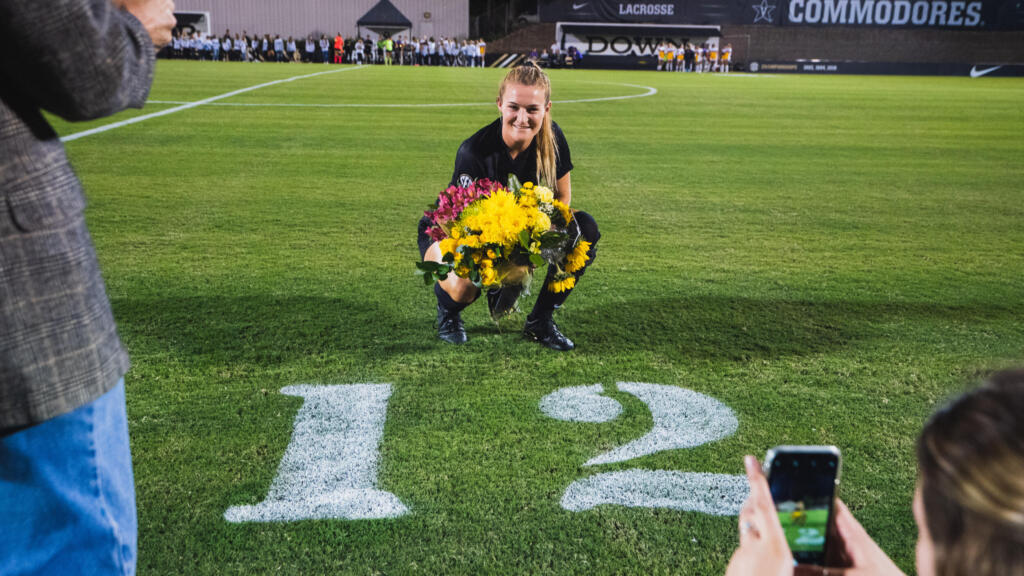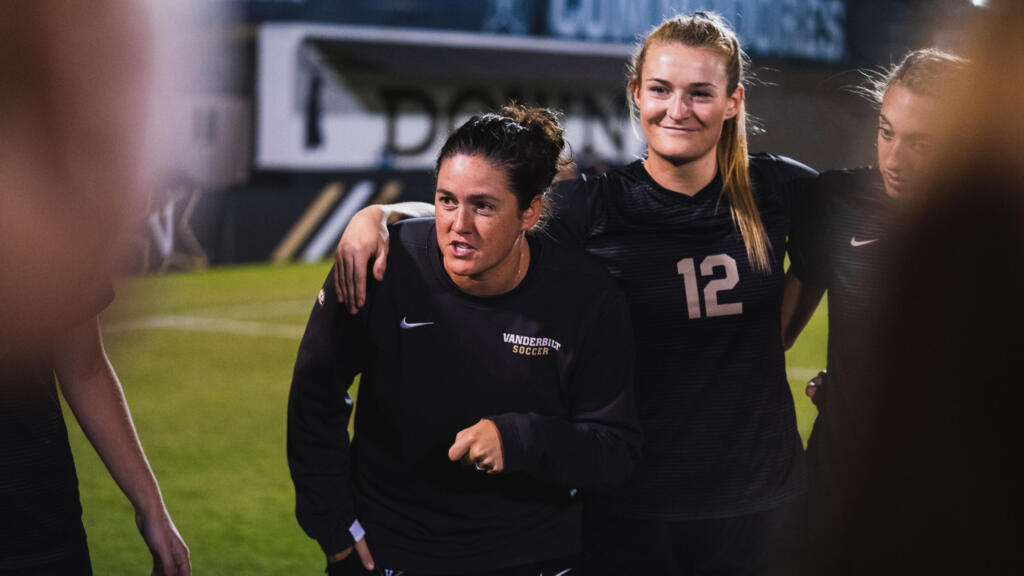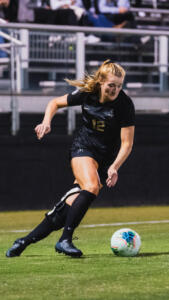Everything Happens for a Reason
by Hannon EbertsHannon Eberts reveals how injury turned out to be pivotal, positive experiences
In the midst of the Vanderbilt’s 2018 championship run, Hannon Ebert’s season was cut short due to injury. Three hundred sixty-two days later, Eberts was able to compete on her senior day and scored her first goal since her freshman campaign. This is her story.

On Oct. 21, 2018, I tore my ACL, meniscus and strained my MCL. My injury ended my junior season and began a long road of recovery to get back for my senior year.
I am a big believer in, “everything happens for a reason,” and, although it may sound silly to hear at first, getting injured a year and a half ago turned out to be one of the most pivotal and positive experiences of my college career.
For those who may not know, ACL tears are among the most common injuries in women’s soccer. I knew that and I have seen it happen more times than I would have liked to throughout my 16 years of playing. Even though I was fully aware that I could get injured every time I stepped on the field, I never thought it would actually be me. No athlete ever does.
I remember being on the sideline with our trainer, Sara Melby, watching my team finish the game and hearing the doctor tell me, “Your ACL’s gone.”
Of course, at first, I wanted to fight him and tell him it wasn’t, but he obviously knew better than I did. Sitting there in that moment, I knew I couldn’t let the injury control me, but I also knew I had an opportunity to control my recovery.
I needed to do what I could and let God handle the rest.
Before my injury, I often determined my worth and success as a student-athlete on how I was performing on the field. Success on the soccer field was my sense of identity, a source of positive self-esteem and a major stress reliever. Since I couldn’t technically be on the field for a while, I needed to find a way to redefine myself.
My daily routine for the next six months of physical recovery was this:
• Rehab in the training room an hour before practice started.
• Rehab during the two to two-and-a-half-hour practice block and icing for a half-an-hour afterwards.
• When the team didn’t have practice I was still in the training room, along with any teammates who were also out at the time.
• And two-a-days were normal.
Luckily, as the months went by, my physical recovery was relatively smooth. There were setbacks, of course, but nothing insurmountable.
Seeing teammates go through ACL recoveries, I knew a little bit of what to expect as far as physical progress and I knew Melby was the best trainer for the job. What I hadn’t seen of my teammates’ recoveries, however, is the emotional side – the internal battles of whether or not to be done with my sport and the unknowns like when exactly I would be able to jog, let alone run or actually touch a ball again.
The mental piece of my recovery was just as important, if not more important, than the physical progress. If I couldn’t be mentally confident about playing again, I would never get there physically.
I often felt overwhelmed. I struggled with a sense of belonging on my team and finding a new identity in other parts of my life. Most of all, I struggled with patience when things didn’t go exactly how I or Melby had expected them to.
At first, I felt isolated. I felt like I was off to the side working when no one was watching and my only competition was myself.
On the day of my injury, my brother looked at me and told me, “You are still a major part of the team. Your role has just changed.”
He was exactly right.
When I got hurt, several of my teammates had been dealing with their own injuries. Remembering what my brother had told me, and as a rising senior, I decided it was my job to step up and lead by example to the underclassmen who also couldn’t be on the field because now I knew how they were feeling.
I couldn’t predict when one of them would have a rough day, but I could make sure I was always leading by example and giving my own recovery my best as a way to encourage them.

There are a few important things I learned having the same daily routine for months, not exactly sure when things would start feeling normal again: to have a positive attitude, to set realistic goals, to keep the end goal in mind, to use my support systems and to have patience with myself.
Not only were all these things imperative for my recovery, but they were vital in changing my perspective on challenges and unexpected changes in everyday life, even after I was back on the field.
I had to see the necessity of going through rehab each day as an opportunity to improve. I realized that small goals and achievements – like bending my knee to 90 degrees or walking without a limp – were key to keeping myself encouraged. As time progressed, I was able to set longer-term goals, knowing the successes would come with time, positivity, consistent hard work and patience.
The other two incredibly important things I learned are that I needed to let myself be frustrated and that I need to lean on the people who are there to support me. There are a lot of ups and downs for a collegiate athlete recovering from an injury and in my experience, it is impossible and unnecessary to be a beam of sunshine the entire time.
As I mentioned, several of my teammates were also injured at the time that I was. Seeing each of them work as hard as they could constantly reminded me to do the same and I cannot thank each of them enough for their support and encouragement throughout and after my recovery.
Whether it was any of them, or Melby, who always demanded the most from us, I found strength and confidence to keep working toward my goals.
I was also able to take the time to invest in other parts of my life. I traveled to Switzerland on a study abroad in May, took an internship in Nashville for June and July at the Vanderbilt Office of Investments and interviewed for the job I will begin this fall. The journey of my recovery was integral in the different relationships I developed with teammates in rehab and outside of athletics, in my faith and walk with Christ and in personal values and growth.
I spent the summer in Nashville continuing rehab with Melby and getting back into soccer. By the time preseason came around I was ready to go. I was excited about the idea of playing again, but I was also terrified of tearing an ACL again. I considered talking with my coaches about being a student-manager for my last season, but ultimately decided I couldn’t let myself not even try because I knew I would regret that.
I passed two running tests, proving I was fit and driven enough for the soccer part. I began practicing fully and felt so thankful to finally be back on the field with my teammates, covered in wet grass and of course picking out the chunks that got stuck in my new brace. I honestly felt on top of the world. 
Then my knee swelled up – another setback I hadn’t expected at all with how I was physically feeling.
After a few days of sitting out, I got my knee drained and although I didn’t have shocking pain, I got another MRI. The MRI showed bone bruising, which required me to sit out for three weeks to let it heal.
This was one of the toughest times for me. I had tried to play again and my knee reacted poorly. I asked myself over and over: is my knee telling me to let playing go? Should I even try to get back again?
This setback was different than the others – it challenged my confidence in the possibility of playing again. Most of the confidence I had gained was gone and even after the three weeks I was required to sit out went by, I couldn’t get myself to try on the field again.
Fortunately, I didn’t commit to making the choice to end my soccer career because I knew I truly wanted to be back on the field more than anything. I played in my first game my senior year Oct. 13 against South Carolina. I was just about as shocked as anyone when Darren called my name, but I got up and warmed up, just as I had a year ago.
I stood at the half and pulled my knee brace up snuggly and told myself I’d be fine. The thought of that feeling of touching the ball for the first time in a game again still gives me goosebumps. I remember smiling so big, in a bit of disbelief that I was really in a game again.
Senior night for my class was Oct. 18. As it was our last home game for the season, and the last home game ever for my class, emotions were running high. About 20 minutes into the game, Darren called my name to warm up.
My family was at the game and it was the first time they were seeing me play in person since the day I tore my ACL. I jogged to the half and took the field at the next opportunity to sub in.
Two minutes later and on my first touch of the game, I scored.
My arms shot up in disbelief and tears came to my eyes when I saw my teammates running to celebrate with me. In that moment, it was like all of the trials and difficulties that I experienced over the past year didn’t matter anymore. Three-hundred and sixty-two days after I tore my ACL, I scored on my senior night and I couldn’t believe it.
God had put me exactly where I was supposed to be, put the right people in my life and guided me through the wilderness to lead me to that moment and that feeling with my team. I wouldn’t trade any part of my journey if it meant giving up that moment.
An injury can be one of the greatest obstacles for an athlete, but it has the potential to change their life for the better. My hope is that my story helps others see that. What matters most in difficult times is how we adapt, who we lean on and what we believe in. The growth I experienced during one of the toughest times of my college career was greater than I could’ve imagined.
As my time as a Vanderbilt student-athlete has come to an end, I want to say thank you.
Thank you to my family and friends for supporting me every step of the way. Whether times were good or bad, you were there to lift me up.
Thank you to Melby and all the athletic trainers who constantly give their time and hold athletes like me together, physically and mentally.
Thank you to Courtney and the girls in my Bible study group for letting me lean on you during all the hard times and for helping me celebrate the good ones.
Thank you to my teammates, past and present. You’ve each bettered me as a player and as a person and I wouldn’t have wanted to share the countless meals, trips, laughs and locker room dances with anyone else.
Thank you to the fans of Vanderbilt Athletics who make being a Commodore fun. Without you, we wouldn’t love the sports we all play as much as we do.
Thank you to my coaches for giving me the opportunity to join such an incredible institution. I will forever be grateful for the life-long friends I’ve made, for the opportunities I’ve had and for all the unexpected experiences that challenged, matured and shaped me into the person I am today.
See you later, Nashville. Thank you for everything.
Anchor Down!
Hannon Eberts


